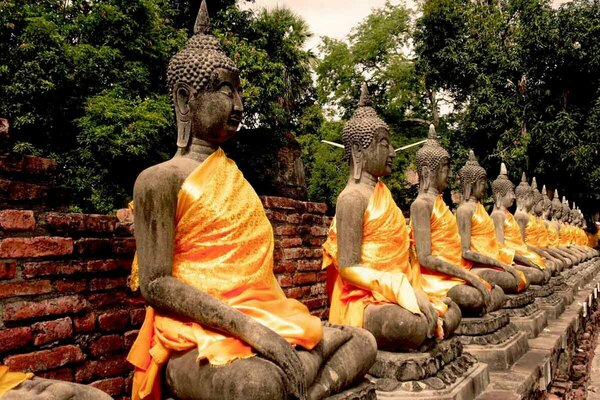
Notre Dame, IN — Notre Dame Law School’s Religious Liberty Clinic filed an amicus brief in the U.S. Court of Appeals for the Eleventh Circuit today in support of a Buddhist association in Thai Meditation Ass’n v. City of Mobile.
The amicus brief contends that the district court incorrectly interpreted the Religious Land Use and Institutionalized Persons Act (RLUIPA), a federal law that protects against zoning and land-use decisions that inhibit religious exercise.
In Thai Meditation Ass’n v. City of Mobile, the Thai Meditation Association of Alabama seeks to build a Buddhist meditation center on a piece of land that it owns in Mobile, Alabama.
The Association is affiliated with the Dhammakaya school of Buddhism, a sect of Theravada Buddhism headquartered in Thailand. As part of its religious exercise, the Association hosts weekly meditation classes that include discussions of Buddhist scriptures and teaching on the Buddha’s Four Noble Truths and Noble Eightfold Path.
Because the Association’s current center—located in a commercial strip mall—provides neither the serenity nor the space needed for these practices, the Association seeks to build a new meditation center on property it owns elsewhere. Originally, it appeared that City representatives would allow the construction of the new center. After receiving hostile complaints from local residents, however, the City reversed course and denied the Association’s request and imposed a series of roadblocks in the approval process.
The Association sued, saying the denial violated its rights to religious exercise under RLUIPA. Initially, its suit was rejected by the district court but that decision was reversed on appeal to the Eleventh Circuit. The Circuit held that the district court had applied an overly restrictive interpretation of RLUIPA and remanded the case so that the district court could reevaluate it under the appropriate, more permissive standard. On remand, the district court again ruled against the Association, finding that their religious exercise was not “substantially burdened” by the City’s refusal of permission to build a new center.
Last week, the Association appealed the case to the Eleventh Circuit for a second time, arguing that the district court misunderstood and misapplied RLUIPA and First Amendment law.
“It is a shame that the Thai Meditation Association has to come to the court of appeals, once again, to vindicate its simple right to build a new meditation center,” said John Meiser, supervising attorney of the Religious Liberty Clinic. “It is clear that the City’s refusal to allow the new construction cannot stand. The Association needs a new center to fulfill its religious needs and the City’s decision leaves them with no reasonable means to build it. The district court’s refusal to recognize that, now for a second time, prolongs this group’s wait for what they should have been allowed to build years ago.”
The Religious Liberty Clinic’s brief argues that the district court’s decision “imposes barriers to relief under RLUIPA that neither the statute nor this [the Eleventh Circuit] has recognized.” It urges the court to “both to fix the erroneous decision below and to ensure that other courts will not repeat the same mistake.”
“The district court’s decision is wrong on the law, but it’s even worse for the people who need this new facility,” Meiser added. “Every wrong decision, every new appeal requires them to wait longer. We hope that the Eleventh Circuit will once again correct the district court’s error—and that this will be the last time it needs to do so.”
Notre Dame students Josh Lacoste and Athanasius Sirilla, as well as Georgetown University Law Center student Megan Schneider, assisted Meiser and Francesca Matozzo, legal fellow with the Initiative, with the brief.
“The students did a great job of making sense of the prior decisions of this case and organizing the Eleventh Circuit’s prior opinion within RLUIPA’s statutory scheme,” Matozzo said. “To be effective, lawyers must know how to assist a court in bringing clarity to its own reasoning. This brief provided the students with an excellent opportunity to develop that skill.”
The brief refers to a number of factors cited by the court, asserting that they lack compelling interest sufficient to justify burdening the Association’s religious exercise under RLUIPA.
“Not only was working on this brief intellectually stimulating from a legal standpoint, but it was also an opportunity to understand just how tangible the consequences of the court’s pending decision can be,” said Lacoste, a 3L student in his second year of work with the Clinic. “As someone who appreciates the idiosyncratic value of faith-focused gathering places, I hope that the Eleventh Circuit issues a right and just decision.”
“It was a privilege to be welcomed into Notre Dame’s Religious Liberty Initiative as a visiting student and to take part in its mission,” said Schneider, a 2L student at Georgetown who interned with the Clinic this summer. “This experience encapsulates many of the reasons I am an aspiring lawyer: to receive mentorship from skilled attorneys, to contribute to the defense of constitutional rights, and to work alongside passionate and principled individuals. I am hopeful our efforts will help secure a just outcome for the Thai Meditation Association, and contribute to robust protections for religious exercise in the Eleventh Circuit.”
Established in 2020, the Notre Dame Law School Religious Liberty Initiative promotes and defends religious freedom for all people through advocacy, formation, and thought-leadership. The initiative protects the freedom of individuals to hold religious beliefs as well as their right to exercise and express those beliefs and to live according to them.
The Religious Liberty Clinic has represented individuals and organizations from an array of faith traditions to defend the right to religious worship, to preserve sacred lands from destruction, to promote the freedom to select religious ministers, and to prevent discrimination against religious schools and families.
Learn more about the Notre Dame Religious Liberty Initiative at law.nd.edu/RLI.
Contact: Anna Bradley, program manager, Religious Liberty Initiative, 574-631-6003, abradle4@nd.edu
Originally published by at law.nd.edu on September 16, 2022.